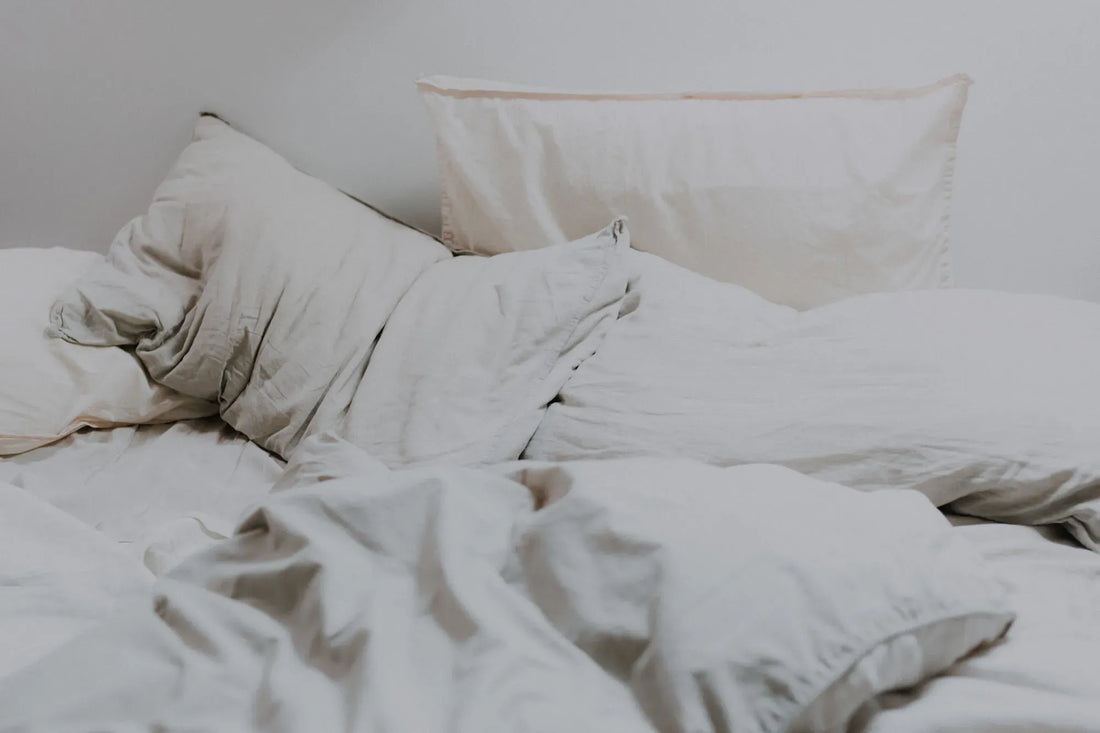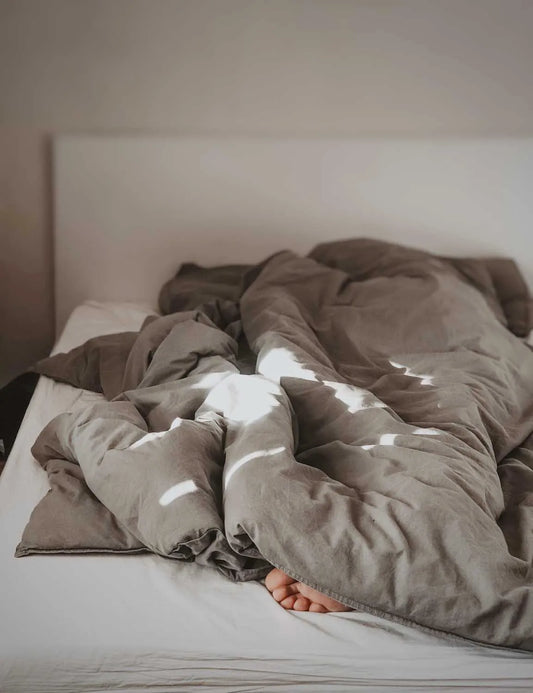| This article is for informational purposes only and is not intended as medical advice. Always consult your healthcare provider for guidance regarding sleep disorders and treatment options. |
Dive into the intriguing topic of sleep disorders, their symptoms, causes, and treatments. At Remly Sleep, we're dedicated to leveraging research for product development, and The Dream Lab is our way of sharing the knowledge we gain with you. In this comprehensive guide, we'll explore common sleep disorders in more detail, helping you better understand how they can affect your life and what steps you can take to improve your sleep quality.
Common Sleep Disorders
Sleep disorders are conditions that disrupt normal sleep patterns, leading to difficulties falling asleep, staying asleep, or achieving restorative sleep. Sleep is a critical component of our overall well-being, and disruptions in our sleep patterns can have a profound impact on our physical, mental, and emotional health. Some common sleep disorders include:
- Insomnia
- Sleep apnea
- Restless legs syndrome
- Narcolepsy
- Circadian rhythm sleep disorders
Understanding the different types of sleep disorders is the first step toward better sleep and improved overall health. In this guide, we'll delve into each of these disorders, discussing their symptoms, causes, and treatments, as well as providing helpful resources for further exploration.
Insomnia
Insomnia is the most common sleep disorder, characterized by difficulty falling asleep or staying asleep, leading to daytime fatigue and other symptoms. Insomnia can be acute (short-term) or chronic (long-term), with various potential causes, including stress, medical conditions, and lifestyle factors. It affects millions of people worldwide and can have a significant impact on daily functioning and quality of life. Learn more about the prevalence and impact of insomnia. Studies: Learn more about what the research says.
It's essential to recognize the signs of insomnia and understand the factors that can contribute to this sleep disorder. By identifying the causes and symptoms of insomnia, you can take steps to address the issue and improve your sleep quality.
Symptoms
- Difficulty falling asleep
- Waking up frequently during the night
- Waking up too early
- Daytime fatigue and irritability
- Difficulty concentrating or focusing on tasks
- Mood disturbances, such as anxiety or depression
- Decreased performance at work or school
- Increased errors or accidents
Causes
There are many factors that can contribute to the development of insomnia, including:
- Stress, which can result from work, school, or personal issues
- Anxiety or depression, which can disrupt sleep patterns and exacerbate insomnia
- Medical conditions, such as chronic pain, sleep apnea, or thyroid disorders
- Medications, including some antidepressants, stimulants, and blood pressure medications
- Poor sleep environment, such as a noisy or uncomfortable bedroom
- Substance abuse, including the use of alcohol, nicotine, or recreational drugs
- Lifestyle factors, such as irregular sleep schedules, excessive caffeine intake, or lack of physical activity
- Psychological factors, such as rumination or worry, which can make it difficult to relax and fall asleep
Treatments
Various treatment options are available for managing insomnia, depending on the underlying cause and severity of the condition. Some common treatments include:
- Cognitive-behavioral therapy for insomnia (CBT-I), which helps address negative thoughts and behaviors that may be contributing to insomnia
- Sleep hygiene improvements, such as creating a comfortable sleep environment, establishing a consistent sleep schedule, and limiting exposure to screens before bedtime
- Relaxation techniques, including deep breathing exercises, progressive muscle relaxation, and meditation, which can help calm the mind and prepare the body for sleep
- Medications, such as prescription sleep aids or over-the-counter sleep aids, which may be recommended for short-term use to help break the cycle of insomnia
- Alternative therapies, such as acupuncture, herbal remedies, or aromatherapy, which may be beneficial for some individuals
Sleep Apnea
Sleep apnea is a potentially serious sleep disorder in which breathing is repeatedly interrupted during sleep. The most common form, obstructive sleep apnea (OSA), occurs when the airway becomes blocked during sleep, often due to the relaxation of throat muscles. Central sleep apnea, another form, results from the brain's failure to send proper signals to the muscles controlling breathing. Sleep apnea can lead to a range of health problems, including high blood pressure, heart disease, and impaired cognitive function. Discover more about sleep apnea and its consequences.
Recognizing the symptoms of sleep apnea is crucial, as early diagnosis and treatment can help prevent complications and improve overall health.
Symptoms
- Loud snoring, which may be accompanied by gasping or choking sounds
- Gasping or choking during sleep, often noticed by a bed partner
- Pauses in breathing during sleep, also typically observed by a bed partner
- Daytime sleepiness, even after a full night's sleep
- Morning headaches, which may be a result of oxygen deprivation during sleep
- Difficulty concentrating or memory problems
- Decreased sexual desire or impotence
- Waking up with a dry mouth or sore throat
Causes
Several factors can increase the risk of developing sleep apnea, such as:
- Excess weight, which can contribute to the narrowing of the airway
- Anatomical factors, such as large tonsils, a large tongue, or a small jaw
- Family history of sleep apnea
- Smoking and alcohol use, which can cause inflammation and relaxation of airway muscles
- Use of sedatives or tranquilizers, which can also relax the airway muscles
- Age, as sleep apnea is more common in older adults
Treatments
Various treatments are available for sleep apnea, ranging from lifestyle changes to medical interventions:
- Continuous positive airway pressure (CPAP) therapy, which involves wearing a mask connected to a machine that delivers a constant stream of air pressure to keep the airway open during sleep
- Oral appliances, such as custom-made mouthguards that help to reposition the jaw and tongue to maintain an open airway
- Lifestyle changes, such as weight loss, smoking cessation, and reduced alcohol consumption, which can help alleviate sleep apnea symptoms
- Positional therapy, which involves using pillows or devices to encourage sleeping on the side rather than the back, as sleeping on the back can exacerbate sleep apnea
- Surgery, in some cases, to remove excess tissue in the throat, correct structural abnormalities, or implant devices to stimulate the airway muscles
Restless Legs Syndrome
Restless legs syndrome (RLS), also known as Willis-Ekbom disease, is a neurological disorder characterized by an irresistible urge to move the legs, usually accompanied by uncomfortable sensations. Symptoms often worsen during periods of rest or inactivity, particularly in the evening and at night, which can lead to sleep disturbances and impact overall quality of life. Explore more about the causes and management of RLS.
Understanding the symptoms, causes, and treatments of RLS can help individuals manage the condition and improve their sleep quality.
Symptoms
Common symptoms of restless legs syndrome include:
- Unpleasant sensations in the legs (e.g., creeping, crawling, tingling, or aching)
- Irresistible urge to move the legs, often in response to the uncomfortable sensations
- Symptoms that worsen during rest and improve with movement, such as walking or stretching
- Sleep disturbances, including difficulty falling asleep or staying asleep due to leg discomfort
- Daytime fatigue, resulting from sleep disruptions
Causes
The exact cause of restless legs syndrome is often unknown (idiopathic), but several factors have been associated with the condition:
- Genetic factors, as RLS tends to run in families
- Iron deficiency, which can affect dopamine production in the brain
- Certain medications, such as antidepressants, antipsychotics, or antihistamines
- Chronic kidney disease, which can lead to imbalances in minerals and hormones that may contribute to RLS
- Pregnancy, particularly in the third trimester, though symptoms typically resolve after delivery
Treatments
Various treatments are available for managing restless legs syndrome, depending on the underlying cause and severity of symptoms:
- Iron supplementation, if blood tests reveal an iron deficiency
- Medications, such as dopamine agonists, benzodiazepines, or anticonvulsants, which can help alleviate RLS symptoms
- Lifestyle changes, including regular exercise, maintaining a consistent sleep schedule, and adopting good sleep hygiene practices
- Warm or cold compresses, which can provide relief from leg discomfort
- Massage and relaxation techniques, such as yoga or meditation, which can help to reduce stress and ease RLS symptoms
Narcolepsy
Narcolepsy is a chronic neurological disorder characterized by excessive daytime sleepiness and sudden, uncontrollable episodes of sleep (sleep attacks). Narcolepsy can also be accompanied by other symptoms, such as sleep paralysis, hallucinations, and cataplexy (sudden muscle weakness triggered by emotions). Living with narcolepsy can be challenging, as it can impact daily functioning and overall quality of life. Read more about narcolepsy and its challenges.
Recognizing the symptoms, causes, and treatments of narcolepsy is essential to managing the disorder and improving sleep quality and daily functioning.
Symptoms
Common symptoms of narcolepsy include:
- Excessive daytime sleepiness, often resulting in unintended naps or sleep attacks
- Sleep attacks (sudden, uncontrollable episodes of sleep), which can occur at any time and in various situations
- Sleep paralysis (temporary inability to move or speak when falling asleep or waking up), which can be a frightening experience
- Hallucinations during sleep transitions, often vivid and realistic
- Cataplexy (sudden muscle weakness triggered by emotions), which can lead to a loss of muscle tone and control, sometimes causing falls or injury
Causes
Several factors have been associated with the development of narcolepsy:
- Genetic factors, as certain gene variations have been linked to narcolepsy
- Autoimmune reaction, in which the immune system mistakenly attacks and destroys specific brain cells that produce hypocretin, a neurotransmitter that helps regulate sleep and wakefulness
- Brain injury or tumor, which can disrupt normal brain function and lead to narcolepsy
- Certain medications, such as antidepressants or antipsychotics, which can affect sleep regulation
- Infections, such as streptococcus, which may trigger an autoimmune response in susceptible individuals
Treatments
While there is no cure for narcolepsy, various treatments can help manage the symptoms and improve daily functioning:
- Medications, such as stimulants, antidepressants, or sodium oxybate, which can help alleviate excessive daytime sleepiness, cataplexy, and other symptoms
- Scheduled napping, which can help to reduce daytime sleepiness and improve alertness
- Regular sleep schedule, which can help to regulate the sleep-wake cycle and improve overall sleep quality
- Good sleep hygiene, including maintaining a comfortable sleep environment, avoiding caffeine and alcohol close to bedtime, and establishing a bedtime routine
- Support from friends, family, and healthcare providers, which can help individuals cope with the challenges of living with narcolepsy
Circadian Rhythm Sleep Disorders
Circadian rhythm sleep disorders (CRSDs) are a group of sleep disorders characterized by a misalignment between an individual's internal sleep-wake cycle and the external environment. This can lead to difficulty falling asleep or waking up at desired times, sleep disturbances, daytime fatigue, and mood disturbances. Some common CRSDs include delayed sleep phase disorder, advanced sleep phase disorder, and shift work sleep disorder. Learn more about the impact of CRSDs on daily life.
Understanding the symptoms, causes, and treatments of circadian rhythm sleep disorders is essential for managing these conditions and improving sleep quality and overall well-being.
Symptoms
Common symptoms of circadian rhythm sleep disorders include:
- Difficulty falling asleep or waking up at desired times, often resulting in sleep disturbances and insomnia
- Sleep disturbances, including fragmented sleep or early morning awakenings
- Daytime fatigue and sleepiness, which can interfere with daily activities and performance
- Mood disturbances, such as irritability, anxiety, or depression, which can result from chronic sleep disruptions
Causes
Several factors have been associated with the development of circadian rhythm sleep disorders:
- Genetics, as certain gene variations have been linked to circadian rhythm sleep disorders
- Environmental factors, such as exposure to light at night, which can interfere with the natural sleep-wake cycle
- Shift work, which can disrupt the body's internal clock and lead to sleep disturbances and other symptoms
- Jet lag, which can cause temporary disruptions in the sleep-wake cycle due to rapid time zone changes
- Irregular sleep schedules, which can interfere with the normal synchronization of the body's internal clock and the external environment
Treatments
Various treatments can help manage circadian rhythm sleep disorders and improve sleep quality and daily functioning:
- Light therapy, which involves exposure to bright light at specific times of day to help reset the body's internal clock
- Melatonin supplementation, which can help regulate the sleep-wake cycle and improve sleep quality
- Chronotherapy, a gradual adjustment of sleep schedule to help the body adapt to a new sleep-wake pattern
- Behavioral interventions, such as maintaining a consistent sleep schedule, improving sleep hygiene, and creating a relaxing bedtime routine
- Medications, in some cases, to help manage symptoms or improve sleep quality
Concluding Thoughts
Sleep disorders are a prevalent issue, affecting millions of people worldwide. Understanding the symptoms, causes, and treatments of common sleep disorders is essential for managing these conditions and improving sleep quality, health, and overall well-being. Adequate sleep is a vital aspect of a healthy lifestyle, and seeking help from healthcare professionals and implementing appropriate interventions can make a significant difference in the lives of those struggling with sleep disorders.
Disclaimer: This article is for informational purposes only and is not intended as medical advice. Always consult your healthcare provider for guidance regarding sleep disorders and treatment options.
General Tips for Improving Sleep
Regardless of the type of sleep disorder you may be experiencing, certain habits and practices can contribute to better sleep quality and overall well-being. Here are some tips to improve your sleep:
- Create a sleep-conducive environment: Ensure your bedroom is cool, dark, and quiet. Invest in a comfortable pillow and consider using a sleep mask, such as the Remly Sleep Mask, to block out any light that may interfere with your sleep.
- Establish a consistent sleep schedule: Going to bed and waking up at the same time each day, even on weekends, can help regulate your body's internal clock and improve sleep quality.
- Develop a relaxing bedtime routine: Engaging in calming activities, such as reading, taking a warm bath, or practicing relaxation techniques, can signal your body that it's time for sleep.
- Limited exposure to screens before bedtime: Blue light emitted by screens can interfere with the production of the sleep hormone melatonin. Consider using a blue light filter on your devices or wearing blue light blocking glasses, like the Remly 70% Blue Light Blockers, in the evening.
- Exercise regularly: Regular physical activity can help you fall asleep faster and enjoy deeper sleep. However, avoid intense workouts close to bedtime, as they may have the opposite effect.
- Manage stress: Practicing stress-reduction techniques, such as meditation, deep breathing exercises, or yoga, can help improve sleep quality.
Closing note: Thank you for exploring with us at The Dream Lab. Remly Sleep is on a mission to make you sleep better by sharing the latest sleep research and incorporating this knowledge into our innovative products. We're excited to journey together and discover more insights on sleep and well-being. Remember, a good night's sleep is the foundation for a healthy and happy life.




